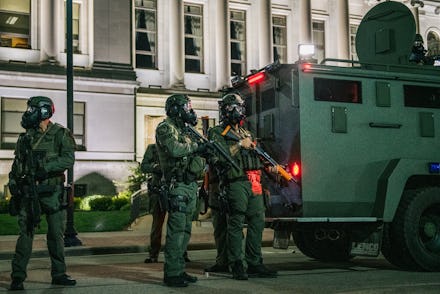Jacob Blake is paralyzed after being shot by police, and protesters demand justice

On Sunday, Kenosha police shot Jacob Blake, a 29-year-old Black man, in the back, adding to the list of this summer's police shootings of Black people and intensifying the calls for racial justice. Blake was rushed to the hospital for surgery, and on Tuesday, the Chicago Sun-Times reported that Blake had emerged from surgery, alive. According to his father, also named Jacob Blake, the younger Blake is paralyzed from the waist down as a result of the shooting, though the Sun-Times reported that doctors aren't sure whether the paralysis is permanent.
Blake was shot multiple times by police while standing in the doorway of his car with his back turned to officers. His children were inside the vehicle. Blake's father is driving from his home in North Carolina to Kenosha to be with his son. He told the Sun-Times, "I want to put my hand on my son’s cheek and kiss him on his forehead, and then I’ll be okay. I’ll kiss him with my mask. The first thing I want to do is touch my son." He also said his son has "eight holes" in his body; in the video of the shooting that went viral, seven shots could be heard, but it's unclear how many officers fired in total or how many hit Blake.
The Wisconsin Department of Justice will investigate the police shooting of Blake, and civil rights attorney Benjamin Crump has agreed to represent Blake's family.
Months after the city of Minneapolis erupted in protests against the police killing of George Floyd, residents in Kenosha, Wisconsin, are engaging in an uprising of their own in the aftermath of the police's point-blank shooting of Blake. Blake, a father of six, was attempting to break up a fight between two other people, witnesses said, when officers were dispatched to the area. Bystander footage shows Blake attempting to re-enter his car, where three of his children were waiting, when a white officer grabbed the back of his shirt and fired his gun several times. In the video, a person can be heard screaming.
Sunday was Blake's son's eighth birthday, a friend of Blake's said.
Almost immediately after the shooting, a crowd of protesters gathered in the neighborhood. The protests continued Monday and into the evening, with video recordings posted to social media showing some protesters setting the local jail on fire, among other city, county, and state-owned structures. On Monday, Wisconsin Gov. Tony Evers (D) deployed the Wisconsin National Guard to assist local police with protecting buildings, controlling protests, and enforcing an 8 p.m. curfew. Evers also said that the National Guard was dispatched to "ensure Kenoshians are able to assemble safely." Kenosha police attacked protesters who had gathered outside a press conference with pepper spray, the ACLU of Wisconsin said, while local NPR affiliate WUWM said tear gas, a chemical weapon, was also used.
In response to the activation of National Guard troops in Kenosha, the ACLU of Wisconsin wrote in a statement, "Deploying the National Guard in response to people exercising their right to protest is unnecessary. People in Kenosha have a constitutional right to express their indignation over the police shooting of Jacob Blake, as well as to demand an end to the epidemic of police violence that has systematically harmed and killed Black and brown people for generations."
Solidarity protests have already broken out in cities around the country. In New York, protesters marched down Fifth Avenue demanding justice for Blake, and in Minneapolis 100 protesters took to the street late Monday evening. Eleven people were arrested.